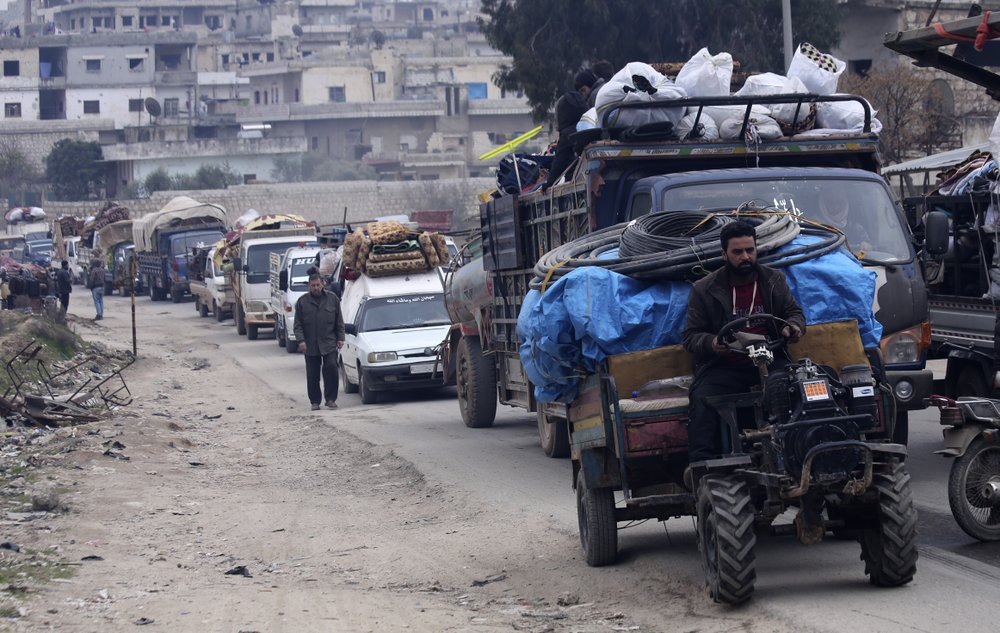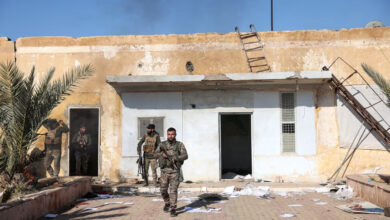
DAMASCUS, Syria (AP) — Syrian government forces captured one of the largest and most strategic rebel-held towns in the country’s northwest, the Syrian military and opposition activists said Wednesday, part of a Russian-backed military assault that has displaced hundreds of thousands of people fleeing to safer areas.
The town of Maaret al-Numan in Idlib province, which had been in rebel hands since 2012, sits on the highway linking Damascus with Aleppo and is considered critical to President Bashar Assad’s forces. The town is now largely empty as a result of intense bombardment in recent weeks.
Its capture is the latest in a series of military triumphs for Assad. His forces have retaken control of most of the country from rebel fighters, largely because of blanket air support from Russia, which helped turn the tide in the nearly nine-year civil war.
Syria’s nearly nine-year conflict left more than 400,000 people dead and displaced half of Syria’s population, including more than 5 million who are refugees, mostly in neighboring countries.
An exception has been Idlib province, in the northwestern corner of the country near the Turkish border, which is held by opposition fighters and is dominated by al-Qaeda-linked militants. The province is home to some 3 million people, many of them internally displaced.
Syrian government forces have been on the offensive for more than a month in Idlib province, the last rebel stronghold in the country. But in recent days, the government captured more than a dozen villages in the area as the insurgents’ defenses began to crumble.
“Our armed forces continued operations in southern parts of Idlib with the aim of putting an end to crimes committed by terrorist groups,” said army spokesman Brig. Gen. Ali Mayhoub. He listed more than a dozen villages and towns captured, including Maaret al-Numan.
The Britain-based Syrian Observatory for Human Rights, an opposition war monitor, said insurgents withdrew from the town late on Tuesday. Syrian troops had left a road west of the town opened apparently to give a chance for insurgents to pull out and to avoid street battles inside the town.
Amid intense airstrikes and heavy bombardment, trucks loaded with displaced people from areas surrounding Maaret al-Numan, including Jabal al-Zawiya, headed toward areas near the Turkish border, already bursting with internally displaced people.
“Only God knows where our destination will be, where we will find a house. We do not know anything, maybe we will sleep in the car,” said one woman who was among those fleeing with her family on Tuesday. She declined to give her name, fearing for her safety.
The Syrian Response Coordination Group, a relief group active in northwestern Syria reported that until the end of December more than 216,000 people fled their homes in Idlib. In a new release, the group said that 167,000 fled since the beginning of January bringing the total number to more than 383,000 people.
Farther north, government forces began an offensive on the western suburbs of Aleppo in an attempt to push insurgents away from Syria’s largest city. Rebels have rained artillery and mortar shells down on Aleppo in recent days.
Maaret al-Numan sits on the highway linking Damascus with Aleppo, once Syria’s main commercial hub. With the town’s fall, government forces are now closer to retaking the critical north-south highway.
In August, Syrian troops captured another town along the highway, Khan Sheikhoun. Now that Syrian troops are in control of Maaret al-Numan, their next target is likely to be Saraqeb, which would become the last major town on the M5 highway that remains outside government control.
Reporting by Bassem Mroue
Image: Syrians drive through the city of al-Mastouma, in Idlib province, as they flee a government offensive, Tuesday, Jan. 28, 2020. Syrian government forces have been on the offensive for more than a month in the northwestern Idlib province, the last rebel stronghold in the country. But in recent days, the government captured more than a dozen villages in the area as the insurgents’ defenses began to crumble. (AP Photo/Ghaith Alsayed)




